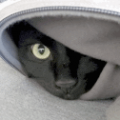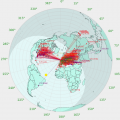rrobinet
I have configured several Kiwis for wifi access by attaching an inexpensive router configured as a Wifi client to the ethernet port of the Kiwi. This $25 TP Link has worked well for me:
https://smile.amazon.com/TP-Link-Wireless-Portable-Travel-Router/dp/B00TQEX8BO/ref=sr_1_14?keywords=tplink+wifi+router&qid=1548188019&sr=8-14
In principle one could enable the internal BB Wifi or attach a USB wifi adapter, but I am reluctant to fiddle with the Kiwi's OS.
About
- Username
- rrobinet
- Joined
- Visits
- 1,325
- Last Active
- Roles
- Member
- Points
- 9
-
FST4W
-
FST4W
Hi Steve,
I am adding support for all the FST4W-nnn modes to wsprdaemon V3.0.
The auto-wspr feature built in to the Kiwi is a port from an earlier version of WDSJT-x and required a significant amount of code rewriting. Also, that current autowspr feature is severely constrained by the limited CPU power of the BeagleBone.
It was at John's suggestion that I started the wsprdaemon project which moves all of the WSPR signal processing to a remote server which can run the latest releases of WSJT-x and have as much CPU power as is required to execute the new WSPR modes.
Rob
-
Alternatives to reverse proxy
-
wsprdaemon - A Raspberry Pi WSPR decoding service
V2.9 had a bug which blocked generating noise level graphs. That has been fixed in 2.9a and you can learn more at: http://wsprdaemon.org/forum.html -
wsprdaemon - A Raspberry Pi WSPR decoding service
I owe to Jim the suggestion to implement this important MERG feature in WD.
Here is a fuller explanation and example of the use of MERGed receivers:
1) MERG_K0_K1 merges the spots decoded from KIWI_0 with those decoded from KIWI_1
2) MERG_K0_A0 merges the decodes from KIWI_0 with decodes from the analog audio output of a 10M receiver
3) MERG_K0_A1 merges the decodes from KIWI_0 with decodes from the analog audio output of a 20M receiver
This is *NOT* diversity reception where the RF or audio signals are mixed. The decodes are performed separately on the signals from each of the MERGed receivers, from which WD picks the best set of decodes to be posted to wsprnet.org.
As a configuration example, here is a section of the conf for my Pi4 with two local Kiwis and two USB audio dongles attached:
When so configured, on 20M WD merges the signals received by AUDIO_1 with those from KIWI_0 and posts only one copy (the strongest) of each received signal.declare RECEIVER_LIST=( "KIWI_0 192.168.1.20:8073 AI6VN CM88mc NULL" ### Kiwi fed by 160M - 10M antenna "KIWI_1 192.168.1.21:8073 AI6VN CM88mc NULL" ### Kiwi fed by 2200M - 160M antenna "AUDIO_0 localhost:1,0 AI6VN CM88mc foobar" ### Audio from a receiver tuned to 10M. The id AUDIO_xxx is special and defines a local audio input device as the source o "AUDIO_1 localhost:2,0 AI6VN CM88mc foobar" ### Audio from a receiver tuned to 20M "MERG_K0_K1 KIWI_0,KIWI_1 AI6VN CM88mc foobar" ### The antennas useful ranges overlap on 160M "MERG_K0_A0 KIWI_0,AUDIO_0 AI6VN CM88mc foobar" ### A 'virtual' receiver useful only for 10M WSPR band "MERG_K0_A1 KIWI_0,AUDIO_1 AI6VN CM88mc foobar" ### A 'virtual' receiver useful only for 20M WSPR band ) declare WSPR_SCHEDULE=( "00:00 MERG_K0_A0,10 KIWI_0,15 KIWI_0,17 MERG_K0_A1, 20 KIWI_0,30 KIWI_0,40 KIWI_0,80 MERG_K0_K1,160 KIWI_1,630 KIWI_1,2200"
Similarly on 10M WD merges the signals received by AUDIO_0 with those from KIWI_0 , and on 160M WD merges signals from KIWI_0 with those from KIWI_1.
Not only will MERGed rxs avoid double posting spots to wsprnet.org, but as importantly when WD is run at verbosity level 1 (start as ./wsprdaemon.sh -va'), WD generates decode reports each two minutes which show all the spots in a MERG rx and which spot was chosen to be posted to wsprnet.org. Here is an example from another WD site of what you can learn in those posting.log files:
You can see from that table that on 40M at 04:42 UTC rx "K76" is generally 1-3 dB more sensitive than "K74"odroid@wspr:/tmp/wspr-captures$ ls -lrt /tmp/wspr-captures/*/*/posting.log -rw-r--r-- 1 odroid odroid 0 Jan 9 21:10 /tmp/wspr-captures/MERGED_RX_0/2200/posting.log -rw-r--r-- 1 odroid odroid 32232 Jan 10 04:41 /tmp/wspr-captures/MERGED_RX_0/17/posting.log -rw-r--r-- 1 odroid odroid 87501 Jan 10 04:41 /tmp/wspr-captures/MERGED_RX_0/20/posting.log -rw-r--r-- 1 odroid odroid 22376 Jan 10 04:41 /tmp/wspr-captures/MERGED_RX_0/12/posting.log -rw-r--r-- 1 odroid odroid 23300 Jan 10 04:41 /tmp/wspr-captures/MERGED_RX_0/60/posting.log -rw-r--r-- 1 odroid odroid 26226 Jan 10 04:41 /tmp/wspr-captures/MERGED_RX_0/10/posting.log -rw-r--r-- 1 odroid odroid 28614 Jan 10 04:41 /tmp/wspr-captures/MERGED_RX_0/15/posting.log -rw-r--r-- 1 odroid odroid 27073 Jan 10 04:41 /tmp/wspr-captures/MERGED_RX_0/80eu/posting.log -rw-r--r-- 1 odroid odroid 47324 Jan 10 04:41 /tmp/wspr-captures/MERGED_RX_0/160/posting.log -rw-r--r-- 1 odroid odroid 88536 Jan 10 04:41 /tmp/wspr-captures/MERGED_RX_0/30/posting.log -rw-r--r-- 1 odroid odroid 24427 Jan 10 04:41 /tmp/wspr-captures/K74/2200/posting.log -rw-r--r-- 1 odroid odroid 53565 Jan 10 04:41 /tmp/wspr-captures/MERGED_RX_0/630/posting.log -rw-r--r-- 1 odroid odroid 65804 Jan 10 04:41 /tmp/wspr-captures/MERGED_RX_0/80/posting.log -rw-r--r-- 1 odroid odroid 24378 Jan 10 04:41 /tmp/wspr-captures/MERGED_RX_0/60eu/posting.log -rw-r--r-- 1 odroid odroid 172637 Jan 10 04:42 /tmp/wspr-captures/MERGED_RX_0/40/posting.log odroid@wspr:/tmp/wspr-captures$ tail -n 20 /tmp/wspr-captures/MERGED_RX_0/40/posting.log Fri Jan 10 04:39:59 UTC 2020: 7.039999 W4ENN -16 -27 -16p Fri Jan 10 04:39:59 UTC 2020: 7.040049 N6KOG -28 -28p Fri Jan 10 04:39:59 UTC 2020: 7.040050 ZS3RF -13 -13p -14 Fri Jan 10 04:39:59 UTC 2020: 7.040069 WA8KNE 1 -0 1p Fri Jan 10 04:39:59 UTC 2020: 7.040073 KJ4IHN -23 -23p Fri Jan 10 04:39:59 UTC 2020: 7.040106 K4APC -5 -14 -5p Fri Jan 10 04:39:59 UTC 2020: 7.040156 N9QDS -20 -21 -20p Fri Jan 10 04:39:59 UTC 2020: 7.040160 -12 -17 -12p Fri Jan 10 04:42:10 UTC 2020: FREQUENCY CALL POSTED_SNR K74 K76 TOTAL=19, POSTED=11 Fri Jan 10 04:42:10 UTC 2020: 7.039999 KD9JYV -19 -22 -19p Fri Jan 10 04:42:10 UTC 2020: 7.040000 -28 -28p Fri Jan 10 04:42:10 UTC 2020: 7.040014 AF4MP -26 -26p Fri Jan 10 04:42:10 UTC 2020: 7.040028 W4DJW -9 -9p -10 Fri Jan 10 04:42:10 UTC 2020: 7.040039 KK1D -22 -22p -22p Fri Jan 10 04:42:10 UTC 2020: 7.040058 W5MWI -23 -24 -23p Fri Jan 10 04:42:10 UTC 2020: 7.040068 VE3OWV -23 -26 -23p Fri Jan 10 04:42:10 UTC 2020: 7.040126 VE6DAI -22 -24 -22p Fri Jan 10 04:42:10 UTC 2020: 7.040141 KK4YEL -24 -26 -24p Fri Jan 10 04:42:10 UTC 2020: 7.040158 W1CEW -21 -21p Fri Jan 10 04:42:10 UTC 2020: 7.040162 W9RAN -1 -3 -1p odroid@wspr:/tmp/wspr-captures$




